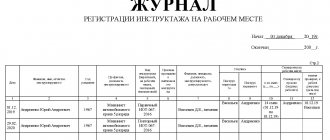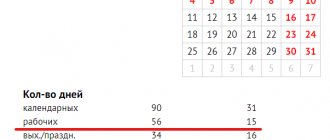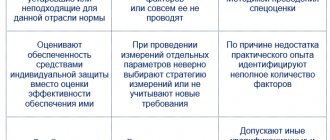This year the special assessment of working conditions (SAL) turns 6 years old. It appeared at the beginning of 2014, and is regulated by the Federal Law of December 28, 2013 No. 426-FZ “On the special assessment of working conditions.” Before this, the procedure was called “Workplace Certification.”
Since then, this procedure has changed several times. The extreme case is amendments dated December 27, 2019, No. 451-FZ. This segment of legislation is constantly being adjusted to improve the quality of assessment. To ensure that workers' rights are respected.
SOUT in 2021
In 2021, the procedure itself has not undergone any significant changes. However, the preparatory procedures and final stages of the special assessment have changed.
The most important thing is that the accredited organization conducting the special assessment now has an obligation to enter the employer into the FSIS SOUT system with the assignment of a special identification number.
The conditions for using assessment results have also changed. From the beginning of 2021, they can be used only from the moment of their registration in the FSIS SOUT system (previously - from the date of approval of the report).
The assessment still needs to be carried out every five years. However, if working conditions have changed, it must be carried out immediately after the changes.
We will prepare the necessary documents and help reduce your costs for SOUT. Leave a request on the website or use the form below and provide your contact information. The manager will contact you and advise:
Main conclusions
The storage periods for occupational safety and health documents, introduced in 2021 and specified in the order of the Federal Archive, are not recommendations, but mandatory requirements. The main threat of non-compliance is not a fine, but the cancellation of the measures specified in the prematurely written off document.
I recommend not to be lazy from the beginning and keep the documentation in order, and having information about the storage periods for documentation, it is worth regularly monitoring the situation so as not to miss the next innovations and instructions.
If you have any questions, even for which there are no clear answers on the Internet, you can ask them in the comments, and we’ll sort it out. And if you need help, contact me, I will help.
The procedure for conducting SOUT in 2020
Conducting a special assessment of working conditions in 2021 consists of the following stages:
- The employing company opens the website of the Ministry of Labor, selects a suitable organization and enters into an agreement with it.
- The appraiser company, within 5 working days from the date of conclusion of the contract, enters the employer into the FSIS SOUT.
The following data is entered: OGRN, INN, full name (full name of individual entrepreneur), number of employees, workplace number, SNILS numbers of employees.
Further:
- the FSIS SOUT system automatically assigns the employer a number in the system , which the appraiser is obliged to inform him of before the start of assessment work;
- the employer issues an order to conduct an assessment and create a special commission;
- the appraiser conducts a special assessment and provides the employer with a report based on the results, which must indicate the employer’s identification number in the FSIS SOUT;
- the employer's commission signs the report . It must also be approved by the chairman of the commission no later than 30 days from the moment it was sent by the appraiser;
- The employer arranges for employees to familiarize themselves with the appraiser's report against signature. Deadline - within 30 days from the date of its approval by the chairman of the commission.;
- the employer's manager, within 3 days from the date of approval of the report, is obliged to notify the appraiser about this by sending a registered letter, or electronically using an enhanced electronic digital signature;
- the employer is obliged to post the assessment results on its official website , taking into account the requirements specified in paragraph 6 of Art. 15 Federal Law No. 426-FZ;
- in accordance with Order of the Ministry of Labor dated 02/07/2014 No. 80n, the employer is required to submit a declaration regarding workplaces with optimal (class 1) and acceptable (class 2) working conditions . The deadline for submission is 30 days from the date of approval of the report.
The appraising company will be obliged to notify the employer that his data has been entered into the FSIS SOUT within 3 working days. She must do this on paper by registered mail, or electronically via UKEP.
Special assessment of working conditions: answers to the most frequently asked questions
I would like to draw your attention to the fact that in accordance with the Federal Law of December 28, 2013 No. 426-FZ “On special assessment of working conditions”, from January 1, 2014, workplace certification was replaced by a special assessment of working conditions.
For five years, that is, until December 31, 2021, all organizations are required to undergo a special assessment at least once. All organizations and individual entrepreneurs must conduct a special assessment of working conditions in relation to workplaces:
— previously not certified;
— certified before 2014 according to the old rules.
The law establishes that all workplaces, regardless of hazard class, are subject to assessment. Even if the organization has only one employee—the general director—a special assessment is still required.
There is no need to conduct a special assessment only in relation to certain categories of employees. Therefore, only if all employees of the organization, without exception, fall into these categories, for example, work from home, there will be no need to conduct a special assessment.
In other cases, a special assessment is required regardless of the organization’s field of activity, the presence or absence of production, the number of employees, etc.
From the totality of the provisions of Article 3, paragraph 2 of Article 8 of Law No. 426-FZ, Articles 22 and 212 of the Labor Code of the Russian Federation, it does not matter in which premises employees work: their own or rented.
It is the employer whose employees perform work in rented premises, and not the owner of the building, office, etc., who is required to conduct a special assessment. If employees constantly work on the road and actually perform work on the customers’ premises, then a special assessment cannot be avoided either.
Employers determine the specific period for conducting the assessment independently, taking into account the actual situation. Thus, all newly created organizations are required to conduct a special assessment within 12 months from the moment of creating new jobs.
A special assessment of working conditions in the workplace is carried out at least once every five years, unless otherwise established by this Federal Law. The specified period is calculated from the date of approval of the report on the special assessment of working conditions.
If you have carried out a special assessment of working conditions, but in the future:
— newly organized workplaces were put into operation;
— received an order from a state labor inspector to conduct an unscheduled special assessment of working conditions in connection with violations of the requirements of this Federal Law or state regulatory requirements for labor protection identified during federal state supervision of compliance with labor legislation and other regulatory legal acts containing labor law norms, contained in federal laws and other regulatory legal acts of the Russian Federation;
— there has been a change in the technological process, replacement of production equipment, which can affect the level of exposure to harmful and (or) hazardous production factors on workers;
— there has been a change in the composition of the materials and (or) raw materials used that could affect the level of exposure to harmful and (or) hazardous production factors on workers;
— there has been a change in the personal and collective protective equipment used, which could have an impact on the level of exposure to harmful and (or) hazardous production factors on workers;
- an industrial accident occurred at the workplace (with the exception of an industrial accident that occurred due to the fault of third parties) or an identified occupational disease, the causes of which were the employee’s exposure to harmful and (or) dangerous production factors -
you are obliged to conduct an unscheduled special assessment of working conditions within the time limits specified in paragraph 2 of Art. 17 of the law.
If the employer does not conduct a special assessment, he will be subject to an administrative fine (Article 5.27.1 of the Administrative Code) in the amount of:
- for individual entrepreneurs - from 5 to 10 thousand rubles;
- organizations - from 60 to 80 thousand rubles.
Conclusion:
To avoid punishment and have time to formalize the results of the special assessment before the end of the year, take the following actions:
- enter into an agreement with the organization that will conduct the special assessment;
- create a special commission from among employees for a special assessment;
- determine the list of jobs that need to be assessed;
- carry out a special assessment procedure;
- formalize the results of the special assessment in the form of a report.
And finally, the “cherry” on the cake:
the Labor Inspectorate can hold you accountable even without conducting an inspection. The inspectorate will receive information about the violation from the Social Insurance Fund, which will transmit information from the 4-FSS report for the first quarter of 2021.
Extension of SOUT in 2021
The special assessment of working conditions will have to be extended both in the event of the end of the assessment period and in the event of changes in working conditions. True, there is still a deferment until October 1, according to the PP dated June 11, 2020 No. 849 , if the assessment period expired between April and September of this year.
There is not much time left, so it is worth thinking about extending the special assessment of working conditions now. The Attek company operates throughout Russia, has 2 of its own laboratories, and certified 150 thousand workplaces in 2021. Our specialists are happy to help you calculate the cost of SOUT
Is it necessary to extend the SOUT?
Last year, the Ministry of Labor, in Letter No. 15-1/OOG-1968 dated August 30, 2019, reminded that there is no need to carry out special assessments every 5 years if the following conditions were met :
- there was no accident with the employee, or it occurred due to the fault of third parties;
- the employee’s health has not deteriorated due to harmful production factors, no occupational disease has been identified;
- no violations of labor law, labor protection standards, or other regulatory legal acts were detected in relation to the employee.
If these conditions are met, the assessment results are extended for another 5 years.
Off-plan assessment
In some cases, the employer needs to conduct a special assessment unscheduled, that is, earlier than after 5 years (Part 1 of Article 17):
- when introducing a new workplace;
- if there is an order from the State Transport Inspectorate to conduct a special assessment;
- when changing the technological process at the workplace, when replacing production equipment, the composition of materials used, raw materials, etc.;
- if an accident occurred at the workplace (not due to the fault of third parties);
- if an occupational disease is detected;
- if there is a reasoned proposal from the elected body of the primary trade union organization to conduct an unscheduled SOUT.
The period for conducting an unscheduled special assessment is 6 months. Moreover, if the organization began its activities after January 1, 2014, all jobs are considered newly created and are subject to special assessment within 6 months.
How to submit a SOUT declaration to the State Tax Inspectorate in 2020
As already stated above, after a special assessment, the employer is required to submit a declaration to the State Tax Inspectorate on whether the workplace meets the following criteria:
- harmless;
- safe;
- optimal;
- acceptable.
Absolutely all workplaces are checked. Workplaces where no hazardous factors have been identified, as well as with working conditions of class 1 and 2, are included in the declaration.
The procedure for filling out and submitting this declaration was approved by order of the Ministry of Labor of Russia dated February 7, 2014 No. 80n. The latest changes to the procedure were made by order of the Ministry of Labor of Russia dated November 14, 2016 No. 642n.
This is done so that the employer can pay contributions at a reduced rate, because its employees work in comfortable and safe conditions.
The basic requirements for filling out the declaration are specified in the Letter of the Ministry of Labor dated June 23, 2014 No. 15-1/B-724.
You need to provide the following information:
- full and abbreviated name of the employing organization or full name of the individual entrepreneur;
- information about the manager;
- company address, INN, OGRN;
- if information is submitted for workplaces located in a branch of an organization that operates without forming a legal entity, the address of the main division of the company is indicated;
- The names of positions or specialties of those employees whose jobs are declared must be listed. It is mandatory to indicate the codes of these specialties;
- number of employees based on the data from the special assessment card (third section of the report);
- individual numbers of workplaces based on the SOUT card, they can be taken from the first column of the list of work places where the SOUT was carried out (section two of the report);
- similar jobs. They should be marked with the letter A (the fourth column of the list from the second section of the report);
- results of SOUT for declared places;
- details of the expert opinion and the surname and initials of the expert.
The completed declaration can be sent to Rostrud by post or electronically using an enhanced qualified digital signature. You can also do this on the Rostrud website
Arbitrage practice
In most cases, officials admit that their explanations are not the final interpretation of legislative norms. Law enforcement practice is still based on court decisions. In what cases, according to the judges, should an employer carry out an unscheduled special assessment in connection with the commissioning of a new workplace?
Based on the Resolution of the Samara Regional Court dated February 12, 2016 in case No. 4A-75/2016, the commissioning of a workplace is the date of approval of the staffing table indicating the position of the employee or the date of acceptance of other documents confirming the availability of the workplace (for example, approval of instructions for labor protection or job description). If we are guided by this rule, then from the date a new workplace appears in the employer’s staffing table, we must begin counting the 12 months provided for conducting a special assessment of working conditions.
At the same time, the courts believe that the following situations are not a reason for an unscheduled carrying out of special assessment (see: Decision of the Tambov Regional Court dated November 09, 2015 in case No. 7-353/2015, Decision of the Krasnoyarsk Regional Court dated December 24, 2015 in case No. 7р-1262/ 2015):
- the employee actually carries out his labor functions at his previous workplace, but the name of his position has been changed and amendments have been made to the staffing table;
- the employing organization has been renamed or reorganized.
Separately, it should be said about the commissioning of similar workplaces. They are also considered newly organized. But the special assessment commission may decide that such places are similar to those for which a special assessment has already been carried out, and therefore there is no need to carry out an assessment in relation to them. Such a decision must be documented in a protocol.
What happens if SOUT is not carried out?
If a special assessment is not carried out, it is obvious that the employer will not be able to pay contributions at a reduced rate. But if this is not an argument for someone, there are also fines according to Art. 5.27.1 Code of Administrative Offences.
If the declaration is not submitted to the State Tax Inspectorate in a timely manner, the legal entity or individual entrepreneur can be fined up to 80 thousand rubles . For a repeated violation, the fine increases to 200 thousand rubles . In addition, the inspection may suspend the company's activities for up to 90 days.
Do not wait until the last moment - conducting a special assessment process takes a certain time (minimum 7 working days). Contact special assessment experts now and get a 10% discount.
Special assessment of working conditions: real savings
For those who have not yet seen the benefits of SOUT, experts from the Klin Institute of Safety and Working Conditions offer to look at the real savings after its implementation. According to their calculations, the benefit of employers for different types of compensation varies from 45 to 5 percent. What you can save on and how much, see the chart.

If the employer doesn’t like the “carrot”, the authorities always have a “stick” at the ready. According to paragraph 2 of Art. 5.27.1 of the Code of Administrative Offenses of the Russian Federation, the liability of employers for refusing to conduct a special assessment of working conditions is significant: a fine of 60,000 to 80,000 rubles for organizations, and for officials - up to 10,000 rubles.
At the same time, practice shows that for failure to carry out special assessments, the total sanctions can amount to up to 400,000 rubles. And since violation of labor safety rules is an offense that the courts regard as significant (see, for example, the decision of the Moscow City Court dated December 14, 2015 No. 7-13480/15), it is unlikely that it will be possible to avoid punishment.
It should be noted that Rostrud is already preparing to conduct raids in order to identify companies where SOUT was not carried out or where some violations were committed. Such unscheduled visits may also result in administrative liability and fines. If the workplace is still vacant or it was created less than 12 months ago, GIT inspectors will not be able to punish for failure to conduct a special assessment.
At the same time, the Ministry of Labor assured that all employers will not be fined in 2021. Officials intend to use the so-called warning mechanism about the inadmissibility of violating labor protection requirements. This means that if a company has not carried out an SAT, it will be given a warning indicating the time frame within which the violation must be eliminated. If the organization refuses to follow the order, only then can it be fined.
The Ministry of Labor is confident that this will allow “a conscientious and responsible employer to eliminate the violation without imposing fines provided for in the Code.” But in fact, this is another small concession on the part of the authorities, which, in our opinion, it would be stupid not to take advantage of.







